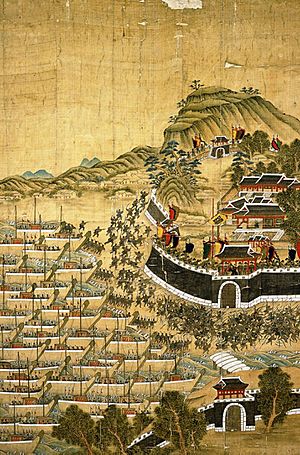Bunroku facts for kids
Bunroku (文禄) was a special name used for a period of time in Japanese history. Think of it like how we have years, but in old Japan, they also had "era names" or nengō. The Bunroku era came after the Tenshō era and before the Keichō era.
This period started in December 1592 and lasted until 1596. During these years, the emperor of Japan was Emperor Go-Yōzei. The word Bunroku itself means "Enlightened Benevolence," which suggests a time of wisdom and kindness.
Contents
Key Events During the Bunroku Era
The Bunroku era saw several important events that shaped Japan's history.
Japan's Invasion of Korea (1592)
- 1592 (Bunroku 1): A powerful leader named Toyotomi Hideyoshi led an invasion of Korea. This event is often called the Bunroku no Eki or the Bunroku-Keichō no Eki. It was a major military campaign that involved many soldiers and ships.
New Discoveries and Coins (1592)
- 1592 (Bunroku 1): Ogasawara Sadayori discovered a group of islands known today as the Bonin Islands. These islands were then given to him by Toyotomi Hideyoshi as his own territory.
- 1592 (Bunroku 1): New silver coins, called Bunroku-tsūhō, were made. Copper coins were also supposed to be made at the same time, but none of them have been found today.
Important Births and Deaths (1593)
- 1593 (Bunroku 3): The former emperor, Emperor Ōgimachi, passed away.
- 1593 (Bunroku 3): Toyotomi Hideyori was born. He was the son of Toyotomi Hideyoshi and his partner, Yodo-Dono. His birth was very important because he was Hideyoshi's heir.
Changes in Power (1595)
- 1595 (Bunroku 4): Toyotomi Hidetsugu, who was an important figure in Hideyoshi's government, lost his position and power.
Land Reforms and Surveys
Between 1589 and 1595, during the Bunroku era, the government carried out big projects to understand the country better. They reformed how land was owned and used, and they also did a general count of the population. This helped the government manage resources and collect taxes more effectively.
Bunroku Era in Years
This table shows how the Bunroku era years match up with the Western calendar:
| Bunroku | 1st | 2nd | 3rd | 4th | 5th |
|---|---|---|---|---|---|
| 1592 | 1593 | 1594 | 1595 | 1596 |
See also
 In Spanish: Bunroku para niños
In Spanish: Bunroku para niños
 | Anna J. Cooper |
 | Mary McLeod Bethune |
 | Lillie Mae Bradford |


